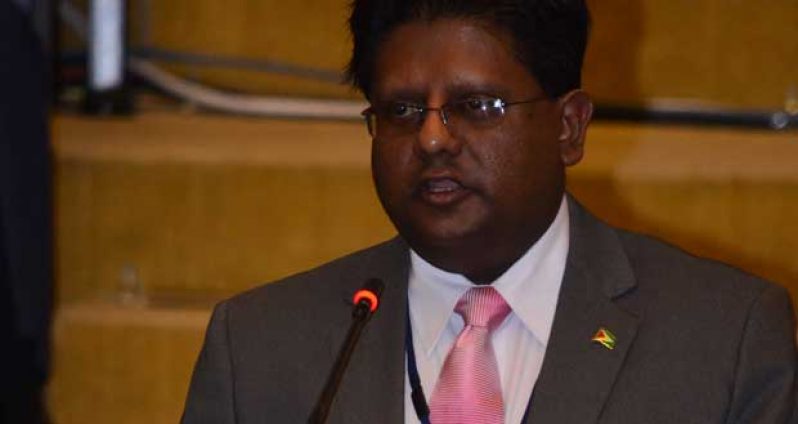–says it’s nothing but a ‘manufactured controversy’
FINANCE Minister, Dr. Ashni Singh yesterday addressed what he described as a “raging furor” over implementation of the Integrated Financial Management and Accounting System (IFMAS).
He further contends that the issue is a “manufactured controversy” that seeks to pull a technical issue into the sphere of politicking.Dr. Singh, at a news conference held at the National Communications Network (NCN) studio, made it clear that the government’s role is to set policy, which is that there should be a strong and robust accounting system, and this policy is conveyed to the relevant technical officers who are charged with its implementation and devise the best solution in this regard.
He explained that the decision to implement IFMAS was executed in 2004 when there was a move from a complete manual system to an automated accounting system.
‘The two modules that are still outstanding are not absolutely critical, simply because all the features imbedded in them are in the current operational system. This, however, does not make it redundant because one is a specialised system, which is what the two modules are, and the operational system only has aspects of the modules’ features that would not be anywhere else’ — Deputy Finance Secretary, Louise Bouyea
This new system, he said, allowed for real-time applications to be executed, as in the case of the timeliness in which decision makers have information readily available.
“IFMAS completely revolutionised the management of public finance management in Guyana,” the Finance Minister said.
PHASED IMPLEMENTATION
He added that the implementation of IFMAS was done in phases, taking several factors into consideration, including: The culture change from manual accounting to an automated system; the priority modules that needed to be implemented based on the needs and where greater value, in terms of accounting practices, will be added; and the alignment of the system to Guyana’s business/ accounting processes.
Dr. Singh noted too that the availability of capacity was also a factor, and pointed out that the Public Service Ministry has a twice-annual training programme that sees some 100 persons trained in the operation of IFMAS.
The first phase saw four modules of IFMAS being implemented: Control, Expenditures, Appropriation and the General Ledger, which the Finance Minister said formed the core of the system.
He said the second phase saw the implementation of two additional modules, namely, Revenue and Treasury Management.
Subsequently, a supplementary module, integrated with IFMAS, Budget Preparation, was implemented.
MISINFORMATION
To date, there remains two modules that have not yet been implemented, and these are Purchasing and Assets/ Inventory.
It is these modules that have been the source of the controversy, led by former Auditor General Anand Goolsarran, who first spotlighted what he said were the potential consequences of not having the modules operationalised.
Dr. Singh flayed Goolsarran for his comments on the matter, and stressed that they are “tainted” by politics.
He acknowledged that the concerns raised by the former Auditor-General are issues that are in no way condoned, but was emphatic in pointing out that it was the IFMAS system that highlighted the very concerns raised.
The Finance Minister decried the creation of a “national scandal” over the non-operationalisation of the two modules.
“It is a blatant misrepresentation that is being peddled,” he said.
Additionally, the Deputy Finance Secretary, Louise Bouyea, who was part of the Minister’s technical team at yesterday’s news conference, expressed similar sentiments as the Minister.
She said: “The two modules that are still outstanding are not absolutely critical, simply because all the features imbedded in them are in the current operational system.
“This, however, does not make it redundant because one is a specialised system, which is what the two modules are, and the operational system only has aspects of the modules’ features that would not be anywhere else.”
IFMAS, as is the practise is many other countries using the system, was customised for Guyana’s use and is augmented by human controls. The system is also periodically upgraded as recommended by its managing technical officers. The last upgrade was in the latter part of 2013.
(By Vanessa Narine)




.png)









